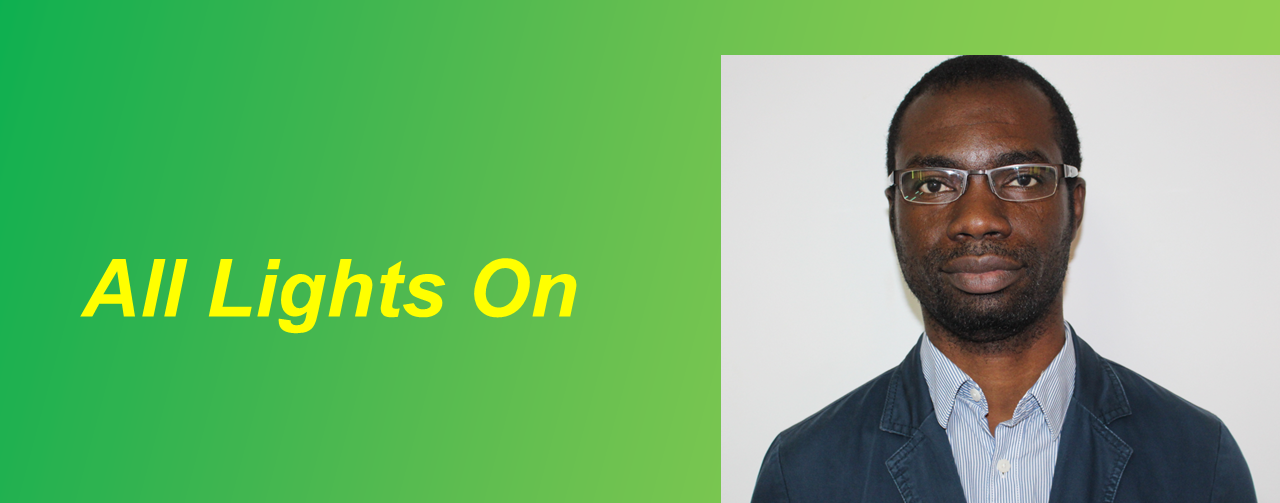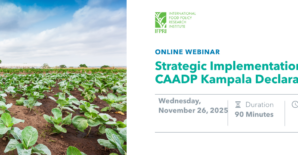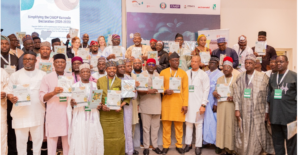What is your academic and professional background?
I have a classic background that some would, however, describe as non-linear. I first started with engineering sciences then switched to economy before graduating from high school. It appeared to me that economy was a very good compromise between the so-called “hard sciences” and the social sciences; one could say that it is the “hardest” of the social sciences. After graduating with a high school degree in mathematics and economic techniques, I took a DEUG (two-year university degree) at the University of Bamako before joining the Centre for studies and research in international development (Centre d’Etudes et de Recherches sur le Développement International - CERDI) in Clermont Ferrand, France. There, I specialized in development economics. I successively obtained a Bachelor’s degree and a Research Master’s degree in economic analysis and policy. Then I took a Professional Master’s degree in project analysis and presented a thesis in International Economy focused on “the impact of agricultural subsidies granted by the United States and the European Union to their producers on world cotton market”. Afterwards, I worked for one year at the French National Centre for Scientific Research (Centre National de la Recherche Scientifique - CNRS) before joining the International Food Policy Research Institute (IFPRI) in Washington, DC. I integrated the Market, Trade and Institutions Division to work on the African Researchers’ Capacity Building Project (AGRODEP), and about one year and a half later I was assigned to the Dakar office.
When did you know that you wanted to start a career in research?
I was first attracted by teaching. It is often said that the best way to learn is to teach. I used to teach during the years of preparation of my thesis. When one wants to teach at a high level, research is essential; research literature must be read and digested before it is transmitted. That’s how I was finally attracted to research, not only as a mediator but also as an actor.
What are your current areas of research?
Currently, my work spans over agricultural economy and international trade. In the area of trade, my team and I are working mainly on two topics: (i) improving the quality of trade data in Africa with the Inter-State Committee for Drought Control in the Sahel (Comité Inter-États de Lutte contre la Sécheresse dans le Sahel - CILSS) and the Economic Community of West African States – ECOWAS and (ii) regional integration processes (enlargement of ECOWAS, future African Continental Free Trade Area, optimal common external tariffs). The issue of data is fundamental, but it is often regarded as an ungrateful subject because it is difficult to publish a work based only on the data. However, we consider this work to be crucial because the quality of our results depends on the data used in our models. To illustrate this with a metaphor, let’s say a chef uses spoiled ingredients, even if he/she is successful and works with the best recipes available, the result, the final dish, will also be spoiled. Researchers are just like chefs: their models are recipes and the data are the ingredients. I let you figure out the rest of the metaphor.
I am also working on the transmission of agricultural prices, specifically on asymmetry issues (price increases are more transmitted than decreases) and the factors that explain this phenomenon: transaction costs and non-competitive (oligopolistic) market structure. I work on this with my colleague Leysa Maty Sall, we apply it to the rice market in Senegal. I then link this econometric work to general equilibrium modelling to examine the effectiveness of some policy measures such as temporary tax suspensions in the event of soaring food prices. I have just started a research program on this topic with my colleague Sunday Odjo.
Can you give us examples of potential use of your research results?
The results can be used by different actors. These may be national policy makers who can address certain outcomes such as the issue of asymmetries in price transmission in order to further open food import markets to competition, for example. The work we are starting on optimal common external tariffs, although very theoretical at first sight[1], can be useful for regional organizations that need to decide the level at which they should set these tariffs when they decide to form a customs union (as it is the case for ECOWAS). These are concrete applications.
What is the daily routine of a researcher?
I think that each researcher has his or her own habits; and it also depends on the specializations. I am a morning person, more active in the early morning, but also in the evening. I therefore start the day with activities that require intense reflection (finding an original idea, explaining a counter-intuitive result, carefully cleaning a database...). The afternoon is more devoted to formatting work and other activities that do not require the same level of concentration. And of course, I also have to handle emails and other solicitations that interfere with the whole process. In addition to these daily activities, researchers often have to deal with series of missions (meetings with decision-makers and donors, participation in conferences, symposia, etc.) and, for some of my colleagues, frequent field visits for data collection.
What do you think are the main qualities that a researcher should have?
There are several schools of thought on this. I think one first needs to be passionate. With research, unlike other activities, you won’t make result without passion. You must get used to spending hours (including nights) on your computer running your programs in order to understand a result. You can’t do that if you don’t have a minimum of passion. All the great researchers I know are passionate. It is also important to be curious and open to new ideas, to explore new fields and look at what others are doing; this will lead to new avenues. One famous economist, Friedrich Hayek, said that “nobody can be a great economist who is only an economist”. Last but not least, researchers must be rigorous, work tirelessly and never assume that talent and effort are perfect substitutes, because they are not, as Avinash Dixit, another famous economist, so rightly pointed out.
In your opinion, which of your works has been the most influential?
Surprisingly, my most influential work is not a research article. I would say that the work we have been doing with CILSS for almost three years on measuring informal trade in West Africa is the one that had the greatest impact. Thanks to our review and advisory work at CILSS, we were able to convince donors who supported the original project to stay, and we also convinced ECOWAS (with the National Statistical Institutes) to integrate the data collected by CILSS into official trade statistics in West Africa. This will improve available data and contribute to monitor certain objectives such Malabo’s objectives of tripling intra-African trade in agricultural products by 2025.
What do you think is the major challenge faced by trade in Africa?
There are many challenges altering transactions in Africa: problems in measuring flows, high levels of barriers (including non-tariff barriers) to regional trade, low level of infrastructure, low integration into world trade, insufficient level of diversification, etc... But if I have to talk about only one challenge, I would say that the most important one is regional integration. Despite formal regional groupings such as ECOWAS, the Common Market for Eastern and Southern Africa (COMESA), etc. the level of constraints to intra-African trade is very high. The African continent has the highest inter-regional tariffs in the world (on average) and many non-tariff barriers and other harassment practices limit the intra-continental trade. This is all the more problematic as increasing regional integration is an optimal strategy to deal with the risks of trade tensions between the United States and China, for example, which side effects will be felt in Africa[2]. A better regional integration will reduce possible negative effects (trade diversions[3]) that could result from certain agreements such as Economic Partnership Agreements (EPAs) with the European Union. It is therefore essential to bring the future continental free trade area to reality.
Your final word…
I am very happy to work at IFPRI. The Institute is very close to the academic world in its organization of human relations, which is very important for me. There are people of very high quality and we learn from each other every day. We are the right interface between academic research and policy makers. I joined IFPRI through the AGRODEP project, another very good initiative. I would recommend the Institute without reservation.
Finally, I appreciate Senegal which has welcomed me for six years now!
[1] This refers to an old debate in economics on the so-called “second best” theory.
[2] I am currently working on this subject with my colleagues David Laborde and Antoine Bouet as part of a chapter of the next report on agricultural trade in Africa (Africa Agricultural Trade Monitor-AATM).
[3] When a free trade area is created, this leads to the so-called “trade creation” effects when the reduction in tariffs makes it possible to import more and at lower prices, and “trade diversion” effects when the increase in trade between the countries forming the agreement is made at the expense of a third country that is more competitive but does not benefit from the tariff reduction. This distinction was made by Canadian economist Jacob Viner.



